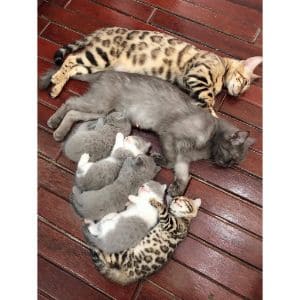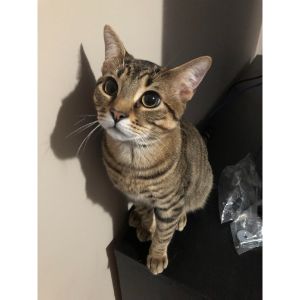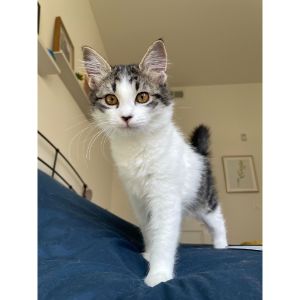Dates make for delicious and nutritious desserts or mid-afternoon snacks. However, we must note that many foods we enjoy can harm our feline family members. So, can cats eat dates?
While dates are not toxic to cats, overindulging can result in various health risks like choking hazards, dental issues, obesity, etc.
However, if you catch your cat nibbling on the dates you left on the kitchen counter, there’s no need to panic. Although it is not best to give dates to cats as treats, they can consume them in small, infrequent amounts.
There are several crucial factors to consider regarding cats eating dates or other human foods. Let us discuss vital information to help you ensure the safety of your precious cat.
Before you scroll further down this guide, check out these other cat-related articles: Can Cats Be Gay? and Why Is My Cat Scared Of Something I Can’t See?.
Are Dates Toxic For Cats?

Indeed, dates are not toxic to cats, and they can eat them on rare occasions. However, it’s important to note that dates are not part of a cat’s natural diet, and it is best not to give them more than one or two small pieces at a time.
Health Effects Of Dates For Cats?

Like most fruits, dates have a relatively high sugar content that may not benefit your cat’s health. Additionally, dates can contain other constituents, such as calories, that may not be ideal for your feline friend.
High-calorie Count
Were you aware that a cat’s daily caloric requirement is only around 200 calories and should not exceed 250? Consuming excessive calories does not provide any nutritional benefit to their body.
It may surprise you to learn that just finishing 10 dates can significantly surpass their daily caloric intake, as each piece contains approximately 20 cal.
If you decide to give your cat dates, it’s crucial to ration the amount to avoid overfeeding.
Choking Hazard

The sticky nature of dates can pose a choking hazard for cats.
As cats try to swallow dates, they can become lodged in their throat, requiring immediate intervention. However, administering first aid to a choking cat can be challenging and should be avoided.
Moreover, the complex, stony substance in the middle of dates is not chewable or easily swallowed by cats, who need more intelligence to understand this.
Therefore, it can lead to choking and other potential health risks.
Dental Issues
The high sugar content in dates can contribute to dental decay, which can be particularly problematic for cats since they cannot brush their teeth.
In addition, dates can retain their sticky nature, accumulating around their teeth as they continue to eat.
Over time, this can lead to the formation of holes and, ultimately, tooth decay.
Excessive Sugar

Many fruits have a high sugar content, which can contribute to weight gain. When consumed in excess, the sugar is converted into glycogen and stored in the cat’s body tissues, leading to noticeable changes in weight.
Additionally, excessive sugar consumption can cause a spike in the bloodstream, potentially resulting in conditions like hypertension.
If you choose to give your cat dates, it’s recommended not to exceed two pieces to avoid potential health risks.
Upset Stomach
Certain foods, such as dates, can accelerate bowel movements when consumed, which may not be suitable for cats whose digestive systems cannot handle such situations.
In addition, the consumption of dates can be harsher on your cat, and the effects may be prolonged and more significant.
If your cat passes loose stools or vomits after consuming dates, it may be due to the laxative properties of the fruit.
Severe symptoms to watch out for include severe diarrhea, digestive issues, and extreme illnesses. Considering the potential risks, deciding if it’s worth giving your cat dates as a treat is up to you.
Best Alternatives To Dates For Cats

There are several healthy alternatives that you can give to cats as treats or mid-afternoon snacks. Here are a few options:
Cooked and Unseasoned Chicken or Fish
Cats are obligate carnivores and require a high-protein diet, so cooked chicken or fish can be a great treat.
Cat-specific Treats

Many commercial treats are available in pet stores, formulated specifically for cats and designed to meet their nutritional needs.
Small Pieces of Fruits and Vegetables
While some fruits like dates may not suit cats, small pieces like bananas, blueberries, watermelon, and vegetables like cooked carrots or green beans can be healthy and safe snack options.
It’s important to note that you should monitor your cat after any treat or human food your cat eats for adverse reactions. Also, always consult your veterinarian before adding any new food item to your cat’s diet.
FAQs About Cats Eating Dates

What fruit can cats eat?
Cats are obligate carnivores and do not require fruits in their diet. However, small pieces of certain fruits are okay as occasional treats. Here are some fruits that cats can eat in moderation:
Bananas
Bananas are safe for cats to eat in small quantities. They are a good source of potassium and fiber.
Blueberries
Blueberries are another fruit that cats can eat in moderation. They are a good source of antioxidants and vitamins.
Cantaloupe
Cantaloupe is safe for cats to eat in small amounts. In addition, it is a good source of vitamins A and C.
Watermelon
Watermelon is another fruit that is safe for cats to eat. It is a good source of vitamins A and C and can also help keep your cat hydrated.
It is important to note that you can give any fruit to your cat in small amounts and monitor for adverse reactions. Also, always consult your veterinarian before adding any new food item to your cat’s diet.
Can cats eat raisins?
No, cats should not eat raisins or grapes; keeping these foods away from your cat is essential.
The reason is that raisins and grapes can be toxic to cats, and even small amounts can cause kidney failure, which can be life-threatening.
The exact mechanism of toxicity in cats from grapes and raisins is not yet fully understood, but it is related to the presence of a toxin that can cause damage to the kidneys.
The poison is absent in all grape or raisin products, and it is unclear why some cats are affected while others are not.
However, it is essential to note that the toxic effects of grapes and raisins on cats are present in scientific literature.
Symptoms of grape or raisin toxicity in cats can include vomiting, diarrhea, lethargy, and loss of appetite.
These symptoms can occur within a few hours of ingestion and can progress to more severe symptoms such as kidney failure, which can be life-threatening.
Therefore, if you suspect your cat has ingested raisins or grapes, it is crucial to seek veterinary care immediately.
It is important to note that raisins and grapes are not the only foods that can be toxic to cats. Other poisonous cat foods include chocolate, onions, garlic, and nuts.
Therefore, it is essential to be aware of what foods are safe for cats and to keep all potentially harmful foods out of reach. If you have concerns about what foods are safe for your cat to eat, consult your veterinarian.
What are three toxic foods for cats?
Several foods can be toxic to cats, but three of the most common ones are:
Chocolate
Chocolate contains a compound called theobromine, which is toxic to cats. Even a small amount of chocolate can cause vomiting, diarrhea, seizures, and even death in cats.
Onions and garlic
Onions and garlic contain thiosulfate and disulfides, which can damage cats’ red blood cells and lead to anemia. Symptoms may include weakness, lethargy, and loss of appetite.
Dairy products
While many cats enjoy milk and other dairy products, these foods can cause digestive upset and diarrhea in cats because they are lactose intolerant.
Sometimes, consuming dairy products can also cause skin allergies and ear infections.
Which fruits Can cats not eat?
While cats are obligate carnivores and do not require fruits in their diet, some fruits can be toxic to them. Here are a few fruits that cats should not eat:
Grapes and raisins
Grapes and raisins can cause kidney failure in cats. Symptoms may include vomiting, diarrhea, lethargy, and decreased urine production.
Avocado
Avocado contains a toxin called persin, which can cause vomiting and diarrhea in cats.
Citrus fruits
Citrus fruits such as oranges, lemons, and limes can cause stomach upset in cats. In addition, the essential oils and psoralen found in citrus fruits can be toxic to cats.
Cherries
Cherries contain cyanide, which is toxic to cats. Eating cherries can cause respiratory failure and death in cats.
It is important to note that even if the fruit is safe for cats to eat, you should only give it in moderation as a treat, not as a significant part of their diet.
Conclusion For “Can Cats Eat Dates”

Dates can be a delicious and nutritious treat or mid-afternoon snack, but it’s essential to be aware of their potential health risks to cats.
Although dates are not toxic to cats, overindulging can lead to various health issues, such as weight gain, dental decay, choking hazards, and digestive problems.
If you decide to give your cat dates, it is best to ration the amount and monitor for any adverse reactions.
Always consult with your veterinarian before adding any new food item to your cat’s diet to ensure the safety of your pet cat.
If you find this guide, “Can Cats Eat Dates,” informative and helpful, you can check out these other cat-related articles from our team:
- Why Does My Cat Smell My Breath?
- How Do I Know If My Cat Is Cold?
- Why Does My Cat Have a Swollen Lip?
You can learn more about cats by watching “7 Cat Facts That Will Blow Your Mind!” down below:




